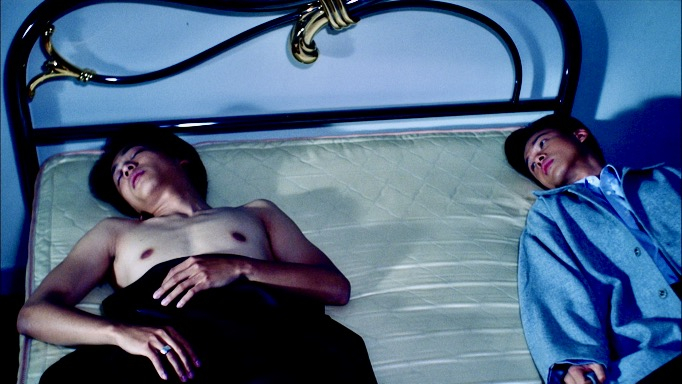
Vive l'Amour (1994) is Taiwanese New Wave film at its best. Director Tsai Ming-liang (Rebels of the Neon God; Goodbye, Dragon Inn) captures the essence of a lonely life in a continuously modernizing world using simple techniques. It's no wonder his sophomore feature won the prestigious Golden Lion award when it was first released. Prolonged shots of people doing everyday things -- shopping in a 7/11, silently flirting at a mall, walking through a park, undressing -- all give the viewer an intimate look at the quiet moments of life. These are private moments that so often go unshared but shape our lives and feelings. It's a slow moving film -- quite the opposite of 2022's blockbusters -- that packs so much life into just under two hours.
The main characters are three cigarette-smoking young adults living in Taipei: May Lin (Yang Kuei-mei), a gorgeous real-estate agent, Ah-jung (Chen-Chao-jung) a mysterious man who becomes May Lin's lover, and Hsaio-Kang (Lee Kang-sheng) a young, homeless salesman. They all share an uninhabited apartment in Taipei that May Lin is trying to sell, without really knowing that each other is there.
The plot is eccentric; we follow our three characters separately and watch as they each briefly interact with one another. Vive L'amour comes across as mundane until you realize what is happening, and the shots of the ever-modernizing city have an unparalleled nostalgia to them. Some highlights: A close up of May Lin sucking Ah-jung's nipple; a work team-bonding activity in which Hsaio-Kang watches awkwardly from the corner (so relatable); Hsaoi-Kang and Ah-Jung forming a friendship, with some sexual undertones; and an unforgettable masterbation scene that serves as the turning point of the film. That's hardly a spoiler, by the way, but rather a reason to watch the entire movie.
It takes a certain skill to capture innate human suffering and feelings of isolation with so little dialogue, and yet Tsai achieves just that. Ten minutes into the film, there's essentially no dialogue, and yet there's emotion and humor streaming through the screen. By the end of the film, the audience is left with an understanding, an emotional response and connection to what these characters have gone through over the course of just a few days. It's a reminder that so much of life happens in silence, even in a huge, bustling city. We do so much alone. Despite pockets of human connection, we are often left with a feeling of loneliness and longing that can sometimes lead to sobbing in a public park in the morning, just like one of our sympathetically dejected characters.
The film is not for everyone. But Vive l'Amour is exquisite. No description could ever do it justice. Some of the long-winded, unwavering views of Taipai's architecture and our characters suffering through a boring day at work are almost insufferable because we know these moments so well. These are the moments that make the film. And if you’re a fan of Taipei, you’ll be intrigued by and satisfied
(Film Movement Classics will re-release Vive L'Amour, winner of the Golden Lion at Venice, in a 2K restoration at New York City's Metrograph on March 18th. Additional major markets will follow.)
